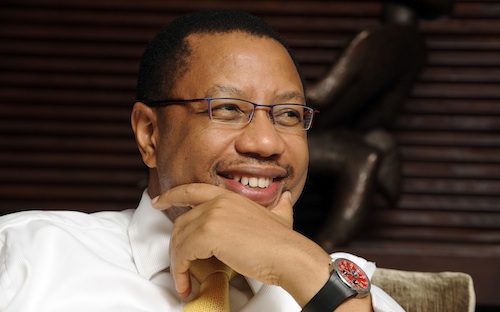“It’s difficult to let go.” Phuthuma Nhleko, MTN’s group president and CEO, sounds almost rueful when I ask him why he’s decided to hang up his hat at the mobile operator.
“You do a lot of soul searching,” he tells me in an interview at the Melrose Arch Hotel in Johannesburg, a day after presenting the group’s 2009 financial results. “I’ve always believed that there’s a time to come and a time to go.”
Nhleko, who has created astonishing wealth for MTN shareholders in the eight years he has been CEO, says a decade is about the most time someone should run a large group like this. “I’m not saying I don’t have the energy to carry on. I do. I just think it’s time to get someone else, someone with fresh ideas who can take it in a different direction.”
Then, with purpose — perhaps signifying a desire to achieve something even bigger than MTN before he retires — the 49-year-old Nhleko adds cryptically: “And life is short.”
Always careful to pick his words, Nhleko won’t say what type of leader he thinks should take over from him. He says he doesn’t want to influence the board at all in its decision.
But when I ask him to list what he regards as the highlights and biggest disappointments of his career at MTN, he is unusually forthcoming.
Nigeria, clearly, is top of his list. When he took the CEO reins in 2003 — he’d been involved with the group as chairman since 2001 — MTN was just entering the vast West African market. Little was known about Nigeria then, and analysts were understandably wary.
Today, that country is MTN’s most successful market when measured against just about every metric. Nigeria has twice as many subscribers as the group’s home market of SA, and is still growing strongly. More than one in every four of MTN’s subscribers is Nigerian.
Nhleko is similarly proud of the group’s entry into Iran, despite sceptics’ initial concerns about political instability there. Iran, too, now has more subscribers than SA.
The 2006 Investcom acquisition, derided by some analysts at the time as expensive (MTN paid US$5,5bn for the business), is another highlight for Nhleko. It allowed MTN to expand through the Middle East and infused the group with new cultural influences, he says.
Lastly, he lists the restructuring of MTN — its operational reporting lines, its performance measurement systems and the like — as a significant achievement of his tenure. He says having the right structure helped the group expand rapidly outside SA.
The biggest disappointment for Nhleko? Surprisingly, it’s not the group’s failure to enter the vast Indian market through its discussions with Reliance Communications and, more seriously, with Bharti Airtel.
No, Nhleko says MTN would be a much bigger group today if it had beaten Kuwait’s Mobile Telecommunications Co (MTC) to buy pan-African operator Celtel. MTC, later rebranded as Zain, outbid MTN by about $600m, paying $3,4bn to secure the deal.
“We were too conservative,” he says. “If we look back today, we could have paid $1bn more and still been in a fantastic position. That’s a regret.”
He seems slightly less perturbed by the collapse in the Bharti talks last year, despite them taking so much of his time. “The outcome was the outcome; we’ve since moved on from that.”
He says it’s unfair to blame regulators alone for the collapse in the talks. He says the two sides were still a long way from reaching a commercial proposition they could take to shareholders.
Some analysts suggested the Bharti deal was doomed from the start. A number of institutional investors spoke out against the deal, saying it wasn’t favourable to MTN shareholders.
Nhleko has faced a lot of criticism like this during his tenure, be it for MTN’s forays into Nigeria and Iran, or the Investcom price tag. He says he’s learnt to deal with it.
“I try to avoid reading all the comments and all the reports,” he says. “If you listened to everyone, you’d never make any decisions.”
He says also that those who criticised MTN’s ventures north of the border now suffer from “selective amnesia”. It’s hard to find any analysts who will admit they were wrong, he says.
“We never ignore what people say, but I do believe companies, and their boards and management teams, have to make their own calls and be prepared to live by them.”
Instead of dwelling on the failed Bharti talks, Nhleko says MTN is focusing its efforts now on improving its operations in the 21 countries in the Middle East and Africa in which it has networks.
He won’t be drawn on whether he might seek to do another blockbuster deal before he leaves the group in March 2011. But he won’t rule out the possibility. For now, though, there’s nothing concrete on the table.
As for his future plans, Nhleko says he hasn’t made any decisions yet. He says he must give more attention to his investment holding company, Worldwide African Investment Holdings. But he’s already thinking bigger than that.
“After being at the helm of MTN for nine years, whatever I do next will have to be a really big challenge,” he says. “It might be a big company, but it doesn’t necessarily have to be.”
What he is certain of is that he’ll remain in SA. Whatever challenge he ends up taking on, even if it involves a company with operations elsewhere in the world, he says he’ll still be based here. — Duncan McLeod, TechCentral
- Subscribe to our free daily newsletter
- Follow us on Twitter or on Facebook


